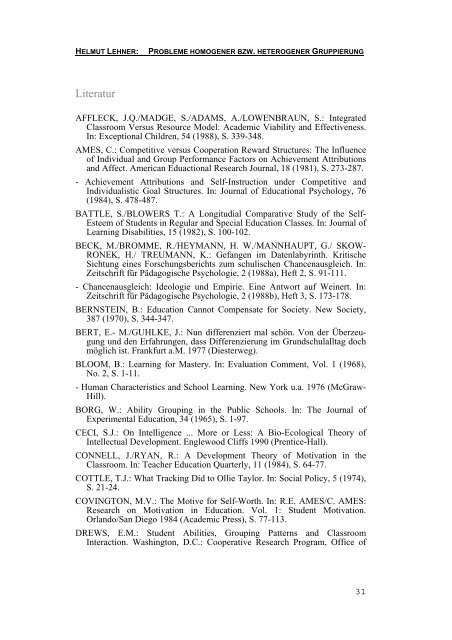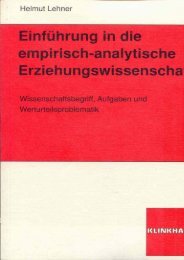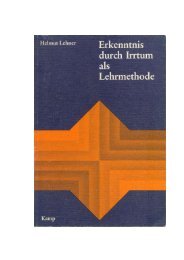Download PDF - Auswirkungen auf die Institution
Download PDF - Auswirkungen auf die Institution
Download PDF - Auswirkungen auf die Institution
Erfolgreiche ePaper selbst erstellen
Machen Sie aus Ihren PDF Publikationen ein blätterbares Flipbook mit unserer einzigartigen Google optimierten e-Paper Software.
HELMUT LEHNER: PROBLEME HOMOGENER BZW. HETEROGENER GRUPPIERUNG<br />
Literatur<br />
AFFLECK, J.Q./MADGE, S./ADAMS, A./LOWENBRAUN, S.: Integrated<br />
Classroom Versus Resource Model: Academic Viability and Effectiveness.<br />
In: Exceptional Children, 54 (1988), S. 339-348.<br />
AMES, C.: Competitive versus Cooperation Reward Structures: The Influence<br />
of Individual and Group Performance Factors on Achievement Attributions<br />
and Affect. American Eduactional Research Journal, 18 (1981), S. 273-287.<br />
- Achievement Attributions and Self-Instruction under Competitive and<br />
Individualistic Goal Structures. In: Journal of Educational Psychology, 76<br />
(1984), S. 478-487.<br />
BATTLE, S./BLOWERS T.: A Longitudial Comparative Study of the Self-<br />
Esteem of Students in Regular and Special Education Classes. In: Journal of<br />
Learning Disabilities, 15 (1982), S. 100-102.<br />
BECK, M./BROMME, R./HEYMANN, H. W./MANNHAUPT, G./ SKOW-<br />
RONEK, H./ TREUMANN, K.: Gefangen im Datenlabyrinth. Kritische<br />
Sichtung eines Forschungsberichts zum schulischen Chancenausgleich. In:<br />
Zeitschrift für Pädagogische Psychologie, 2 (1988a), Heft 2, S. 91-111.<br />
- Chancenausgleich: Ideologie und Empirie. Eine Antwort <strong>auf</strong> Weinert. In:<br />
Zeitschrift für Pädagogische Psychologie, 2 (1988b), Heft 3, S. 173-178.<br />
BERNSTEIN, B.: Education Cannot Compensate for Society. New Society,<br />
387 (1970), S. 344-347.<br />
BERT, E.- M./GUHLKE, J.: Nun differenziert mal schön. Von der Überzeugung<br />
und den Erfahrungen, dass Differenzierung im Grundschulalltag doch<br />
möglich ist. Frankfurt a.M. 1977 (Diesterweg).<br />
BLOOM, B.: Learning for Mastery. In: Evaluation Comment, Vol. 1 (1968),<br />
No. 2, S. 1-11.<br />
- Human Characteristics and School Learning. New York u.a. 1976 (McGraw-<br />
Hill).<br />
BORG, W.: Ability Grouping in the Public Schools. In: The Journal of<br />
Experimental Education, 34 (1965), S. 1-97.<br />
CECI, S.J.: On Intelligence ... More or Less: A Bio-Ecological Theory of<br />
Intellectual Development. Englewood Cliffs 1990 (Prentice-Hall).<br />
CONNELL, J./RYAN, R.: A Development Theory of Motivation in the<br />
Classroom. In: Teacher Education Quarterly, 11 (1984), S. 64-77.<br />
COTTLE, T.J.: What Tracking Did to Ollie Taylor. In: Social Policy, 5 (1974),<br />
S. 21-24.<br />
COVINGTON, M.V.: The Motive for Self-Worth. In: R.E. AMES/C. AMES:<br />
Research on Motivation in Education. Vol. 1: Student Motivation.<br />
Orlando/San Diego 1984 (Academic Press), S. 77-113.<br />
DREWS, E.M.: Student Abilities, Grouping Patterns and Classroom<br />
Interaction. Washington, D.C.: Cooperative Research Program, Office of<br />
31










